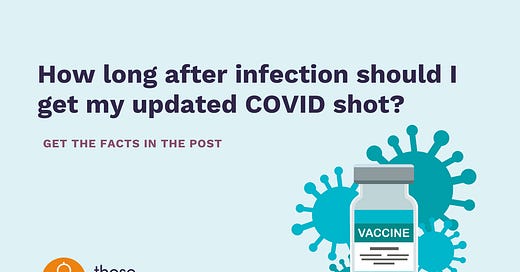How long after infection should I get my updated COVID shot?
Experts recommend waiting 3 to 6 months after infection before getting your updated COVID-19 shot.
Those Nerdy Girls deeply appreciates all of our Substack subscribers. We are especially grateful to our paid subscribers who support the sustainability of our work.
As a thank you for your generous support, all new annual subscribers between now and October 14th will receive a 20% discount for the first year.
Please consider supporting us with your paid subscription. It means so much to us to have you as a valued community member!
How long after infection should I get my updated COVID shot?
Experts recommend waiting 3 to 6 months after infection before getting your updated COVID-19 shot. While it’s safe to get the shot sooner, delaying by 3 to 6 months helps your body to mount a stronger immune response to the vaccine. Optimal vaccine timing also depends on your local guidelines, COVID risk profile, and COVID exposure.
TL,DR: Timing your shot after COVID-19 infection is a balancing act. On one hand, your immune system mounts a better response if you wait a while between infection and vaccination. On the other hand, if you wait too long, you could get infected while your immune system is cooling off. Most experts agree that the sweet spot is between 3 and 6 months after infection. This way, you maximize the immune benefits of your next shot, with minimal risk of re-infection during the wait.
Why is it helpful to wait? First, it gives ample time for your immune response to infection to mature, so that when you deliver the next jab, you’re amplifying the best possible fighters. Second, it reduces “immune interference”. Antibodies from your last infection can hinder your immune system’s ability to “see” and respond to a vaccine because they may bind to vaccine components (eg. the viral spike protein). These principles of vaccination are true across a variety of different vaccines, beyond COVID-19.
To figure out your optimal timing, consider these factors:
Local public health guidelines. COVID-19 vaccination guidelines vary greatly from place to place. In the US, you are eligible for an updated COVID shot as soon as you recover, though the CDC says that “people who recently had SARS-CoV-2 infection may consider delaying a COVID-19 vaccine dose by 3 months from symptom onset or positive test. In Canada, the National Advisory Committee on Immunization (NACI) recommends waiting 3- 6 months after infection before your next shot.
COVID-19 risk profile. If you or a loved one (or close contact) are at high-risk of severe outcomes from COVID-19, a shorter delay between infection and vaccination interval may be warranted.
COVID-19 exposure. If local COVID-19 levels are high, or if you expect to travel overseas, or to a highly risky event, it may be worth getting your shot sooner rather than later.
Practical considerations. Don’t let perfect timing stop you from getting it done! It makes good sense to go with the timing that fits your life, perhaps alongside other shots.
~~~~~~~~~~~~~~~~~~~~~~~~~~~~~~~~~~~~
Related Posts from Those Nerdy Girls:
Updated COVID vaccines are now FDA and CDC approved and available soon in the US!
Can I get the COVID vaccine at the same time as another vaccine?
Resources:
US CDC Guidance on COVID-19 vaccination
Canada’s COVID immunization guidelines
The influence of interval between doses on response to vaccines
ICYMI - Digest of Recent Posts:
Social & Racial Justice: How can I check whether I am registered to vote?
Vaccines and Families/Kids: What’s in childhood vaccines?
Reminder that we now have an online store filled with amazing nerdy merchandise.
Your purchases will help financially support the science communication mission of Those Nerdy Girls.
P.S. We’d love to see pics of you and your friends and family sporting their new TNG swag. You might even be featured in our shop! Email us your pics at info@dearpandemic.org
Like what you read? Please share it with others!
If you have a question, let us know!
We read every question and use them to inform our upcoming content, though we are unable to respond to each specific question.



